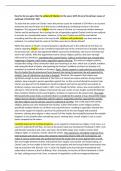How far do you agree that the actions of Charles I in the years 1629-42 were the primary cause of
outbreak of Civil War? (20)
To state that the actions of Charles I were the primary cause for outbreak of Civil War is an accurate
statement and was the basis of all the factors contributing to underlying tensions in the three
kingdoms. The argument that religion was the cause of civil war as it worsened relations between
Charles and his parliament, thus causing the rise of opposition against Charles from his own subjects
is accurate to a considerable extent. However, in the end, Charles was still the man behind
everything and if he did not act in the way he did, relations with parliament may have been less
turbulent. It is evident that the roots of Civil War were due to Charles himself.
Whilst the actions of Charles I in general played a significant part in the outbreak of Civil War, his
actions regarding religion can be considered separately due to the controversary it brought. During
his personal rule, Charles had appointed William Laud as his Archbishop, who was an Arminian but
seen to be Catholic. With this appointment came various religious policies, that were strongly
influenced by Catholicism, something that caused Charles’ subjects to fear there was a popish plot
happening in England, which lead to opposition against the king. The enforced religious policies
included the railing of the communion table and renaming it an altar, which was a Catholic tradition,
and issuing the Book of Sports, disrespecting the Puritans’ traditions of church on Sundays as it
permitted recreational activities on Sundays. Again, Charles support in Laud enforcing such policies
like this fuelled the discontentment faced towards him during his personal rule and supported his
subjects’ fear of Catholicism returning to England. Therefore, this supports that religion was
significant enough to cause outbreak of Civil War as it started an unease and fear among Charles’
subjects, large enough to garner opposition against him. As this occurred during his personal rule,
Charles was ignorant to the displeasure faced in England and tried to spread his new policies to
Scotland, issuing a new prayer book in 1637, even though his father, James, was unsuccessful in his
attempt to. This led to the collapse of personal rule and a series of wars fought, named the Bishops’
Wars, between Charles and his own kingdom, Scotland, in response to the prayer book. The anger
felt towards the prayer book, so extreme that it is considered the catalyst of war, showed the impact
religion had on Charles’ relationship with his subjects, supporting why they opposed him and the
idea that religion was the primary cause for outbreak of Civil War. One could argue that Charles’
religious policies are more important than Charles’ actions themselves as the religious policies
specifically enabled Charles to call Short and Long Parliament, resulting in opposition towards him
and not the support he hoped to get from his parliament for the wars fought with Scotland.
However, claiming that religion is what caused Civil War implies that instability between the multiple
kingdoms is also notable when considering causes, showing that, overall, religion is not a crucial
factor compared to the others.
Instability between the multiple kingdoms can be argued it is important as religion, if not more, as a
cause for outbreak of Civil War. As soon as the prayer book was introduced in Scotland in 1637, riots
and disorder took place and, only a year later, the Scottish clergy were ready to restore their
religious rights. In response, Charles raised his armies. This cataclysmic, immediate response from
both Scotland and Charles shows the turbulent relationship Charles held with his kingdoms and
makes it easy to understand why parliament feared he would raise an army against them as well.
The wars fought between Charles and Scotland were largely unsuccessful, and embarrassing, on
Charles’ part; he was unable to fund his own wars properly and was facing Scottish mercenaries who
had returned from the 30 years' war. In 1639, the English army had retreated immediately and
ended what is known as the First Bishop’s War. Eventually, he had to call Short Parliament in 1640
for help, ending personal rule. Here, a moment of negotiation could have happened between




